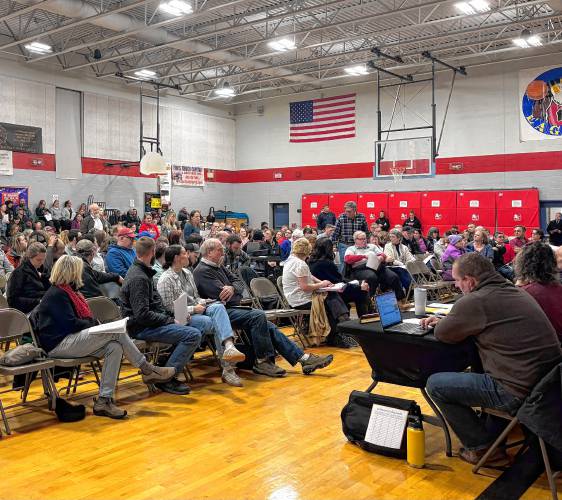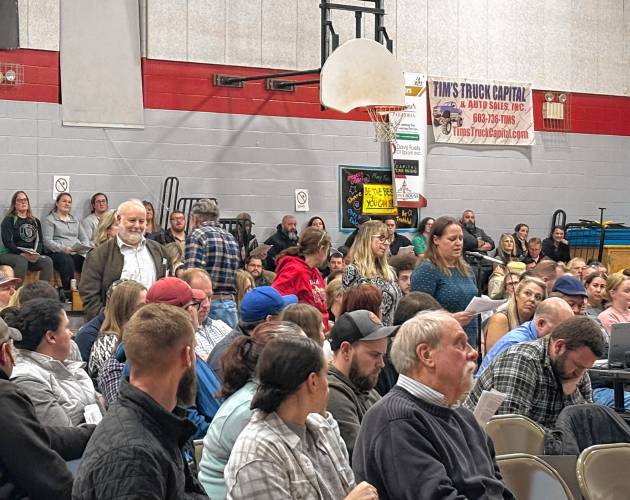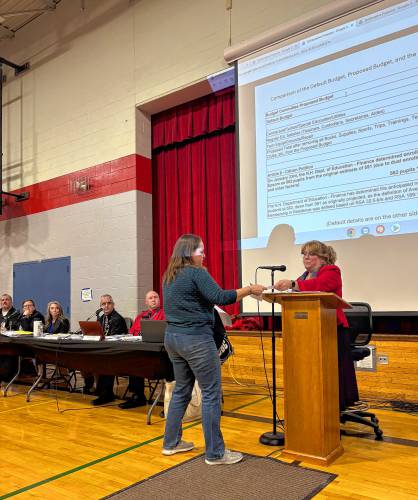Special education takes center stage at Epsom school budget deliberative session
|
Published: 02-05-2025 2:08 PM
Modified: 02-06-2025 8:56 AM |
The cost of special education and the role of state assistance for schools took center stage at Epsom School District deliberative session Tuesday during one of the town’s most widely attended meetings in years, which drew more than 250 people to the Epsom Central School.
An attempt to cap annual spending at $25,000 per pupil was met with widespread pushback, with voters eventually raising the proposed cap to $100,000 per student, four times the actual cost.
Obvious questions about spending lingered as the budget committee and school board disagreed over next year’s operating budget.
The budget committee has recommended an operating budget of $15.1 million, which would represent a tax rate increase of $2.98 and an additional $1,192 a year in property taxes for a $400,000 home. The school board, however, unanimously chose not to recommend that budget. Instead, the board prefers the default budget which is, unusually, higher than the budget committee’s recommendation: $15.2 million, a sum that would increase the tax rate by $3.18. The default budget consists of last year’s expenditures plus or minus one-time contractual expenses.
SAU 53 business administrator Amber Wheeler cited three primary reasons for the increased budget: high school tuition, special education and higher costs for employee health benefits.
Given ongoing reductions in state aid, many residents’ comments and questions at the two-and-a-half-hour session centered around the district’s plan for meeting student needs while mitigating rising taxes. If both the school and town budgets pass with all spending items, the total tax rate in Epsom would increase by nearly $4, amounting to a $1,600 annual tax increase for a $400,000 home.
State Reps. Carol and Dan McGuire, who are Epsom residents, led the filing of a petition warrant article for a proposed $25,000 cap per student per year to the school budget, while accounting for inflation each year.
Last year, the McGuires co-sponsored legislation that established procedures for adopting such tax caps in local school districts.
Article continues after...
Yesterday's Most Read Articles
 New Concord apartments open in former First Congregational Church
New Concord apartments open in former First Congregational Church
 Inside EFAs: How school vouchers have fueled an enrollment boom at Christian schools across New Hampshire
Inside EFAs: How school vouchers have fueled an enrollment boom at Christian schools across New Hampshire
 St. Paul’s School won’t reopen public access to Turkey Pond
St. Paul’s School won’t reopen public access to Turkey Pond
 ‘Bittersweet’: The Post on Main Street closes Friday
‘Bittersweet’: The Post on Main Street closes Friday
 Goodwell Foods takes over Rustic Crust private label frozen pizza
Goodwell Foods takes over Rustic Crust private label frozen pizza
 Messy parking around Concord’s bus terminal won’t get less messy any time soon
Messy parking around Concord’s bus terminal won’t get less messy any time soon
“I’ve heard the request that we increase state spending on education,” Dan McGuire said at the meeting, “we have over the last six years. State spending, just the dollar amount, is up 20%. The per-pupil amount is up much higher because the number of pupils has declined.”
“I wish that we had some kind of magic bucket of money in Concord, but we don’t. The source of money is people in this room and people like us all over the state,” he continued.
The petition warrant article was criticized by many speakers. Resident Carol Zink-Mailloux led a motion to amend the petition article and increase the spending cap to $100,000 per pupil per year, to account for students whose special education services cost more than the proposed cap. That motion passed by a show of hands, and the official article sets a cap of $100,000 per pupil, far more than is currently spent.
Residents such as Kim Gillis spoke out against the initial proposed budget cap and advocated for other approaches to funding concerns.
“As a single-income homeowner, I’m certainly not happy with the tax burden that the increased taxes would mean that we’re probably going to be bearing,” Gillis said. “But as a special education interventionist of 35 years, I care very deeply about the quality of education.”
Gillis emphasized the role of shrinking state support for local schools. “I think we can rest assured that the budget crisis is not a responsibility of the school district itself,” she said.
“There’s been a significant degree decrease in the state funding of education costs for town, also then transferring that responsibility to us as taxpayers,” Gillis added. “I think some of our activism needs to happen on both levels, of course, but to really take it back to representatives and how they are voting to decrease state-level support for public education.”
Another warrant on the budget would place $40,000 into a special education expendable trust fund to handle the extra cost of any student’s needs that are not currently accounted for.
Residents will vote on Epsom’s budget and other warrant articles, including the proposed per-pupil cap, at election day on March 11, held from 7:30 a.m. to 7 p.m. at the Epsom Bible Church.
Rachel Wachman can be reached at rwachman@cmonitor.com










 Bow offers water to Hooksett plant, asks Concord to help fix its supply
Bow offers water to Hooksett plant, asks Concord to help fix its supply Hyper-local, good-news-only paper in Andover is closing
Hyper-local, good-news-only paper in Andover is closing Concord Christian Academy celebrates accomplishment and faith at graduation ceremony
Concord Christian Academy celebrates accomplishment and faith at graduation ceremony
